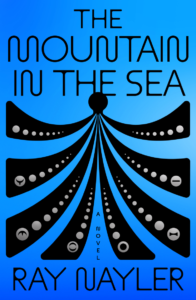
This review is based on an eARC (Advance Reading Copy) provided by the publisher via NetGalley in exchange for an honest review. The Mountain in the Sea will be released on October 4, 2022.
A couple months back, when I saw Ray Nayler’s debut novel pop up on NetGalley, the “philosophical thriller about the nature of consciousness” description caught my eye. I’m quite intrigued by philosophical sci-fi that digs into non-human minds, but the thriller tag kept me from immediately putting in a request. Then I read some of Nayler’s short fiction, with a piece he wrote showing up on my July favorites list and a piece he translated on my August favorites. And I was sufficiently impressed to go back and request that ARC for The Mountain in the Sea. And I’m very glad I did.
The Mountain in the Sea features a handful of mostly-disparate storylines that explore different aspects of the theme, with just enough overlap in character or setting to hint at convergence in the climax. The main story follows Dr. Ha Nguyen, who is brought to a private island by the DIANIMA corporation to work alongside an android studying the local octopus population, trying to determine whether they have achieved sentience, and if so, how to communicate with them. Meanwhile, a mysterious masked woman is interviewing people who lived on the island before DIANIMA acquired it, as well as soliciting the services of an elite Russian hacker on an ambitious secret project. Yet a third subplot follows a young Japanese professional kidnapped to serve on an AI-run slave ship to squeeze value out of increasingly overfished waters.
If it sounds like a sci-fi thriller setup worthy of Michael Crichton, perhaps the marketing as a philosophical thriller can be forgiven. But while the pieces are all there for a thriller plot, The Mountain in the Sea has the feel of something very different, somewhere in between classic first contact and literary fiction. It’s not that there aren’t disparate plotlines converging for a satisfying conclusion—there absolutely are. But Nayler’s debut eschews the thriller’s galloping momentum in favor of storytelling that encourages contemplation of the challenges facing each character and their situation in the broader story of humanity and its uncomfortable relationship with other minds.
And the “philosophical” tag here is serious. We see in-story discussion of Thomas Nagel’s “What is it Like to Be a Bat,” along with plenty of meditation on what it would take to declare another species or an artificial intelligence to be truly sentient. And as a reader with a graduate degree in philosophy, perhaps that’s especially appealing to me. But I don’t think it’s uniquely appealing to me. These are deeply human themes, and Nayler neatly parallels the questions about AI and other species with humanity’s treatment of each other, with Ha in particular haunted by memories of the disastrous consequences of a simple failure to recognize the perspectives of those around her. The effect is to ask big questions in a way that has immediate emotional impact. And while it may not drive the plot quickly forward, it deepens the characters while integrating the philosophical musings into the story, making for some fascinating quiet passages worth lingering over.
If I have any complaint, it’s that the subplots were so immersive that it was easy to miss the forest for the trees. Make no mistake, the disparate subplots tied together into a satisfying whole, one that provided closure when necessary while leaving other big questions open. But much of the theorizing was messy and contradictory. And while I believe some of that contradiction was intentional—and appropriate to the difficulty of the subject—there were other passages that I had trouble squaring. Perhaps that’s on me as a reader, and I should learn to be more comfortable with contradiction. But while I enjoyed the blend of resolution and uncertainty in the conclusion, I felt a little more uncertain than I believe was intended.
Overall, this is a book that’s a pleasure to read and will encourage deep reflection on consciousness and the common human failure to accept the other. It’s one of the few where I’ve gone back and raised my initial rating after spending more time thinking about it. And it’s only aided by comparison to another novel I recently read about contact with an octopus society—the Hugo-longlisted Children of Ruin by Adrian Tchaikovsky—with The Mountain in the Sea featuring much more interesting human characters and a less predictable ending, along with more focus on the fascinating difficulties around what it would take for an octopus society to get started in the first place. Not everyone will resonate with the pacing and the theorizing, but I enjoyed it enough to finish in a long weekend, and it’s only improving upon further reflection. For those who enjoy theorizing in their first contact and literary-adjacent sci-fi, it carries my strong recommendation.
Recommended if you like: first contact, literary-leaning sci-fi, philosophical sci-fi, thematic depth.
Can I use it for Bingo? It’s hard mode for Standalone and 2022 Release.
Overall rating: 18 of Tar Vol’s 20. Five stars on Goodreads.
